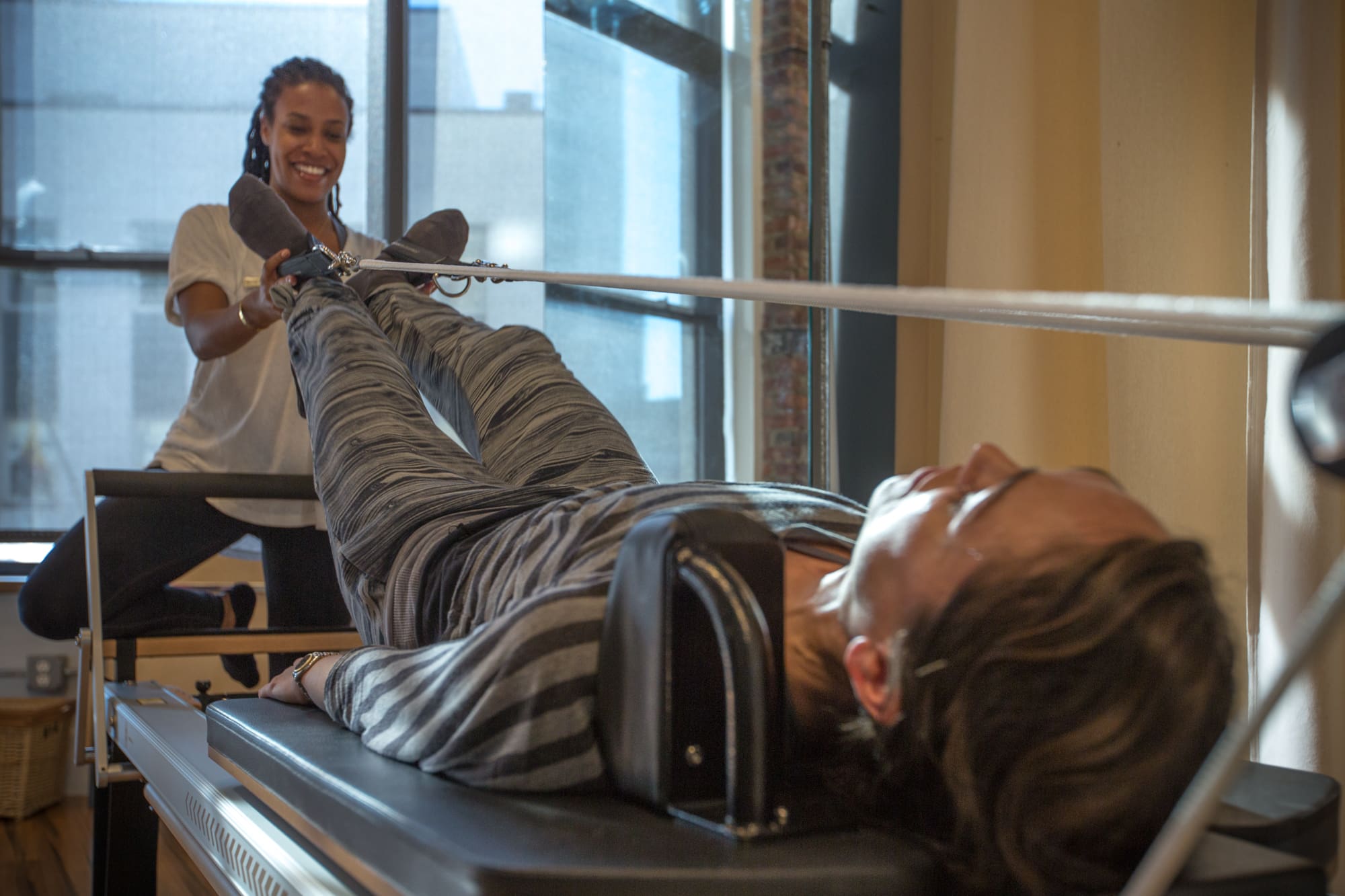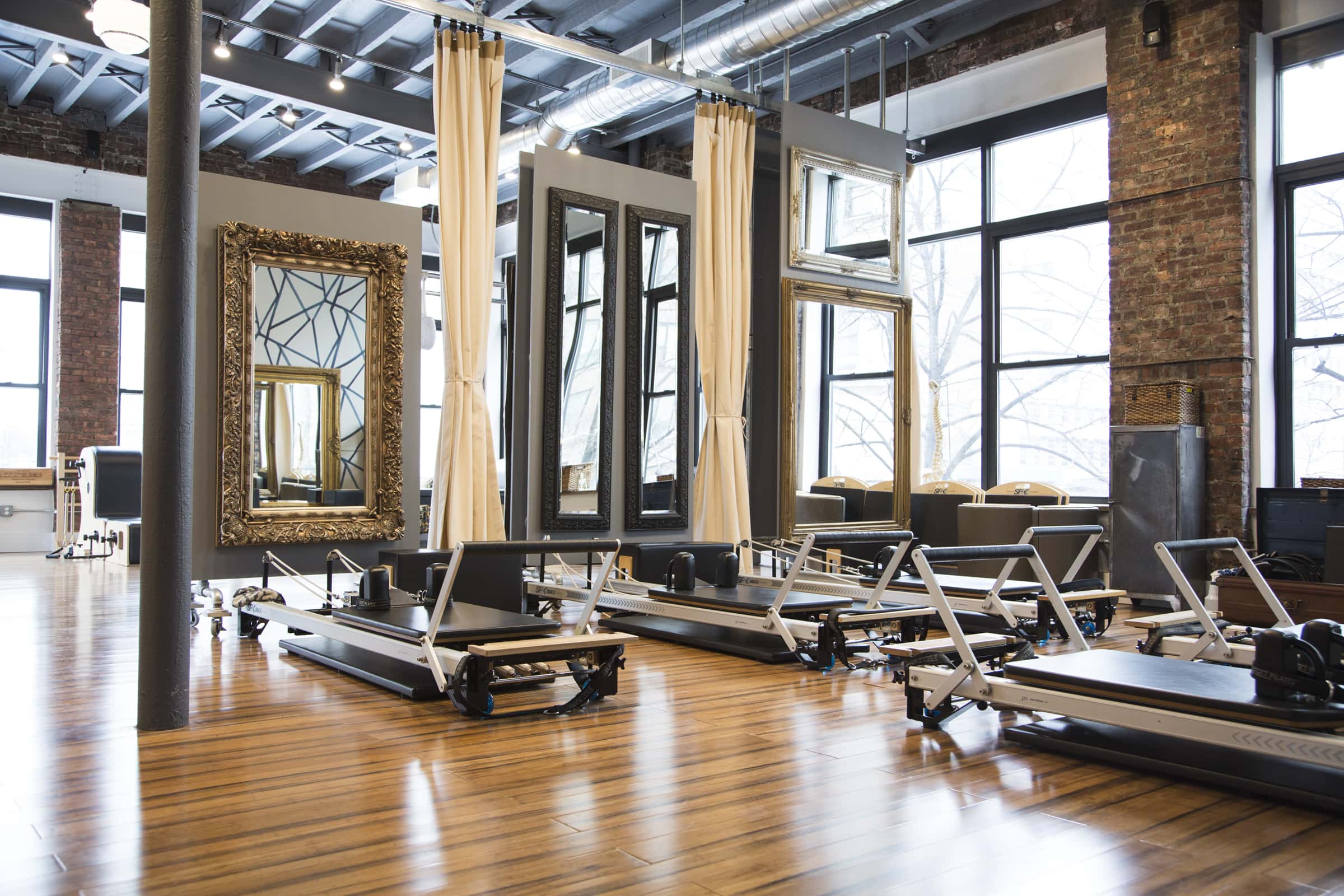
Physical Therapist, Dr. Rachel Tavel, PT, DPT, CSCS explains the history of Physio Logic’s effective Pilates-based Physical Therapy techniques, and what sets it apart from traditional Physical Therapy.
Physio Logic’s Implementation of Pilates-Based Physical Therapy
Physio Logic began with a single Chiropractor. Then one day, that Chiropractor met a Pilates Instructor. The Chiropractor wanted to send his patients somewhere to maintain and continue the gains they made during his sessions, and he noticed great results when his patients incorporated Pilates into their wellness care. The two realized that outcomes were better when they combined forces. But one piece was still missing. When a Physical Therapist entered the picture, the next piece of the puzzle was in place. As a team, they were all better together. Their treatments were more effective and long-lasting, and their patients were stronger than ever before. So, what is it about Pilates that is so beneficial to Physical Therapy treatments?
Improving core strength and body awareness, as well as educating people on proper spinal alignment and posture are all at the core (pun intended!) of both Physical Therapy and Pilates. It is no surprise that these two go so well together.
BASI Pilates Trained Physical Therapists
At Physio Logic, all of our Doctors of Physical Therapy have gone through the extensive BASI Pilates Teacher Training program, a comprehensive program offering the highest caliber of training available. Our Physical Therapists are trained in both traditional Physical Therapy exercises as well as Pilates-based exercises, and often use Pilates exercises in their rehabilitation programs with patients.
Pilates is an exercise practice founded by Joseph Pilates during World War I that improves flexibility and strength while promoting control of movement. Sounds a lot like Physical Therapy, doesn’t it? Pilates incorporates breath and body awareness in a way that helps people harness and control healthy movement. It can be performed without equipment, using just a mat, or with one of the many pieces of equipment often seen in Pilates studios, including the Pilates Reformer and Cadillac.
The Perfect Pairing
Physical Therapists and Pilates instructors have a lot in common. Both want to help people feel stronger, more flexible and more in control of their movement. They both aim to improve alignment and posture, and both want to help people achieve their physical wellness goals. While our education and training may be very different, it is this mutual goal and shared passion to better the health and wellness of our patients/clients that makes working together such a logical pairing.
I am a Doctor of Physical Therapy, not a Pilates Instructor. However, here at Physio Logic we celebrate our differences and our similarities. We learn from each other. Pilates Instructors at Physio Logic often take on the Physical Therapists’ patients in the wellness phase of their treatment plan, when they are no longer in pain and demonstrate improved movement patterns but could still use some guided exercise to maintain and progress their care.
We have a chance to bridge this gap between our specialties by incorporating the very beneficial exercises and cues used during Pilates into our rehabilitation process with patients. While PTs are used to getting creative with gym equipment, the Pilates equipment affords a Physical Therapist endless more possibilities when it comes to creating individualized exercise plans for our patients that will better help them achieve their goals.
The Pilates-Based Physical Therapy Advantage
One of the great things about Pilates, which we Physical Therapists can definitely appreciate, is that almost every exercise can be modified to fit the patient’s abilities and physical limitations. They can be made easier or more difficult with simple adjustments. Even though we are targeting many of the same muscle groups, each person comes into our studio with a different fitness level. Part of being a Physical Therapist is modifying and adapting an exercise to the patient’s changing strength levels. This can be very important as a person goes through PT and begins to get stronger, making some the exercises that were once hard feel easy (and ineffective, at a certain point).
Pilates “gets” this. They have excellent foundation exercises to improve spinal mobility and core strength, as well as complex, dynamic patterns that are for more advanced and strong patients. Sometimes, teaching proper breath patterns is one of the most significant lessons for a patient.
As a Physical Therapist, it has been both fun and exciting to explore the tools and creativity of Pilates-based exercises. It is also a great way to spice up Physical Therapy sessions and get patients to challenge their bodies in new and surprising ways. Often times, our patients transition to Pilates before leaving us completely to continue strengthening and improving their flexibility and control of movement. But mostly, it’s because they fall in love with Pilates.
As a practitioner in a field that requires us to constantly be learning, it has been a pleasure learning more about the Pilates method. It has given me a new perspective on the tools around us, and challenged me to find new ways to guide my patients towards improved health, strength, wellness and happiness.
Physio Logic Pilates Studio
In addition to providing medical services at Physio Logic, we function as a full-fledged Pilates studio. But it is no surprise that the Pilates and medical worlds often merge here. In a way, the lack of walls at Physio Logic represents the lack of division between practitioners; we’re all working as a team bringing our own expertise into treatments to help our patients and clients feel better and stronger than they did before they walked in our door.

By incorporating Pilates-based exercises into our treatments, we are not only helping our patients get stronger and more comfortable with their movement; we are also giving them the gift of a new exercise practice that they can use immediately and throughout their lifespan to continue building on the gains they made during their Physical Therapy sessions, and hopefully prevent future injuries.
In the words of Joseph Pilates, “The mind, when housed within a healthful body, possess a glorious sense of power.” Between Physical Therapy and Pilates at Physio Logic, we hope people can find that power inside and out and take it with them for the rest of their lives.
By Dr. Rachel Tavel, PT, DPT, CSCS